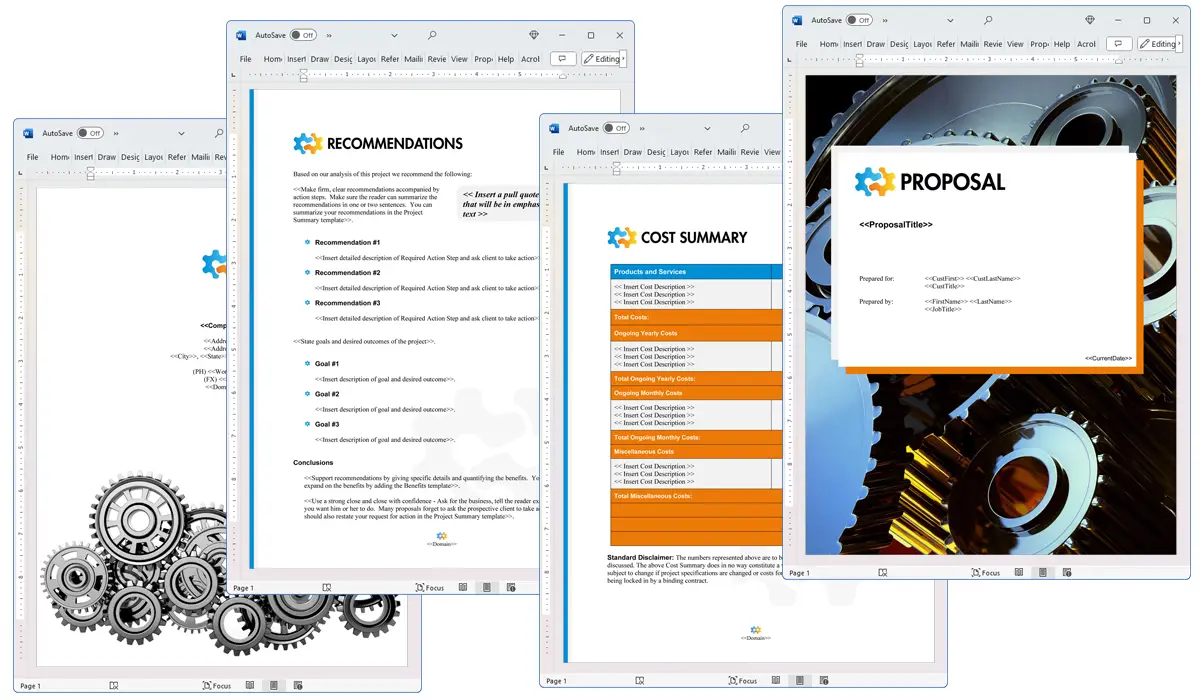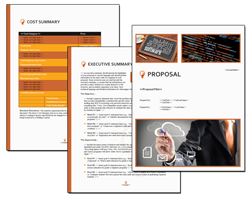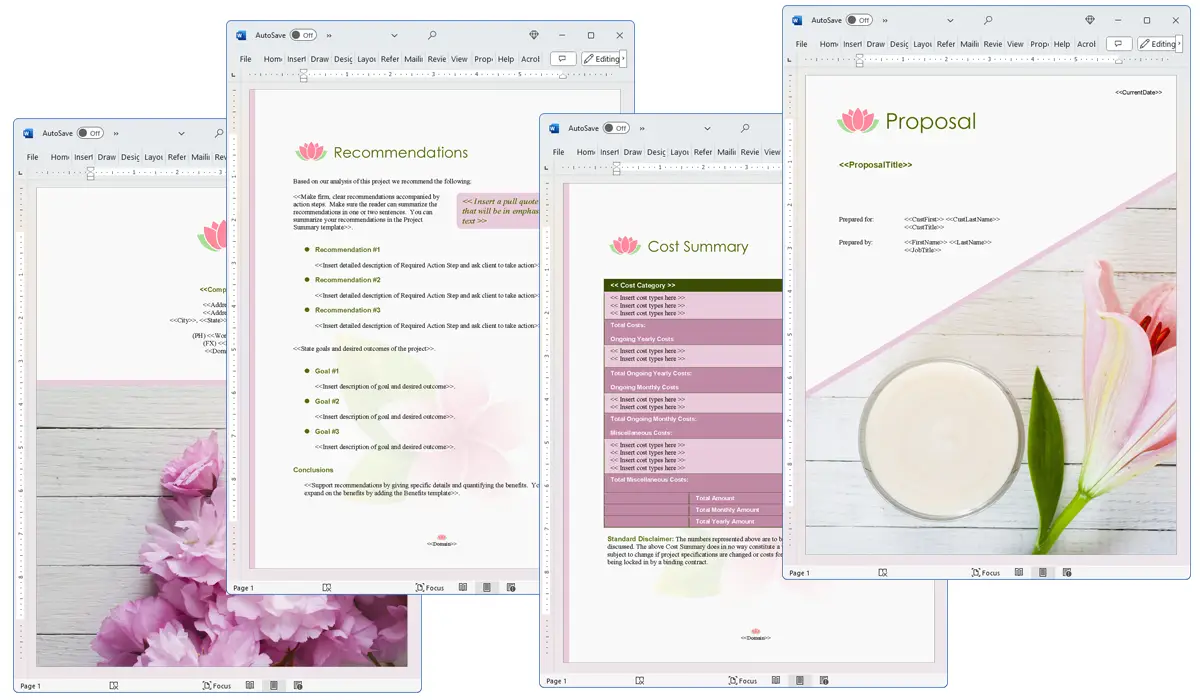What is the Mixed Reality chapter used for?
Proposal Kit Professional Bundle adds more design themes, all six Contract Packs,
a project management library, and Expert Edition software.

Illustration of Proposal Pack Concepts #14
We include this Mixed Reality chapter template in every Proposal Pack, along with thousands more. You assemble this chapter with others in various combinations to create custom-tailored business proposals, plans, reports, and other documents. Proposal Packs apply custom visual designs to the templates, giving the final documents a consistent professional finish.
 DOWNLOADABLE, ONE-TIME COST, NO SUBSCRIPTION FEES
DOWNLOADABLE, ONE-TIME COST, NO SUBSCRIPTION FEES
Overview of the Mixed Reality Chapter
The Mixed Reality chapter is a part of the Proposal Kit system, designed to assist businesses in creating detailed, compelling proposals related to interactive digital projects. This chapter emphasizes the integration of real and virtual worlds, allowing the description and demonstration of how digital objects can be interacted with in a simulated environment. Whether the proposal is for developing a new gaming interface or for enhancing training modules with virtual components, the Mixed Reality chapter provides the foundational framework to articulate these advanced technological solutions.
How is the Mixed Reality Chapter Used?
When used in a business proposal, the Mixed Reality chapter is used to comprehensively explain how mixed reality technology can be implemented in a specific project. It serves to educate potential clients or partners about the benefits and functionalities of mixed reality applications. By including this chapter, businesses can outline the scope of their technological offering, demonstrate their expertise in emerging technologies, and highlight how mixed reality can address specific problems or improve certain processes within the client's operations.
What is Included in the Mixed Reality Chapter?
The Mixed Reality chapter typically includes several key elements:
- Definition and Explanation of Mixed Reality: Clarifying what mixed reality is and how it differs from virtual reality and augmented reality.
- Technical Specifications: Detailing the technical requirements and the hardware and software involved in the mixed reality solution.
- User Interaction: Describing how users will interact with the digital objects and what kind of user experience can be expected.
- Project Relevance: Tailoring the discussion to show the relevance of mixed reality to the client's specific needs or industry challenges.
- Visuals and Diagrams: Incorporating images or diagrams that help visualize the proposed mixed reality setup.
Use Case Examples for the Mixed Reality Chapter
- Web and IT: Proposals for creating more engaging user interfaces on websites using mixed reality elements.
- Software and Hardware: Developing new mixed reality applications and the necessary hardware to support them.
- Technical and Automation: Enhancing automation systems with mixed reality for better control and monitoring.
- Manufacturing and Fabrication: Introducing mixed reality tools to improve precision and efficiency in manufacturing processes.
- Aerospace: Training pilots and crew using mixed reality simulations that mimic real-life scenarios.
- Medical, Healthcare, and Wellness: Proposals for mixed reality applications in surgical training or patient therapy sessions.
- Fitness: Designing fitness programs that use mixed reality to enhance user engagement and performance tracking.
- Research and Science: Using mixed reality for visualizing complex scientific data or conducting remote experiments.
- Education: Enhancing learning experiences by integrating mixed reality into educational content and activities.
Key Takeaways
- The Mixed Reality chapter helps businesses explain the integration and benefits of mixed reality technologies in their proposals.
- It includes technical details, user interaction data, and project-specific applications to make a case.
- Mixed reality can be applied across a wide range of industries, including healthcare, manufacturing, and education.
- This chapter is crucial for proposals aiming to showcase cutting-edge technology solutions that blend real and virtual environments.
- Effective use of the Mixed Reality chapter can significantly enhance the attractiveness of a proposal to potential clients who are looking to innovate in their operations or offerings.

Illustration of Proposal Pack Software #2
 What Our Clients Say
What Our Clients SayThanks to the thoroughness and professionalism Proposal Pack provides we are now closing more than 80% of the critical deals necessary for the growth of our company."
Brian Noon
President
 4.7 stars, based on 845 reviews
4.7 stars, based on 845 reviewsRelated Chapters

The Mixed Reality chapter and other chapters are integrated into a Word document as illustrated here in the Proposal Pack Hospitality #2 design theme. There are hundreds of design themes available, and every design theme includes the Mixed Reality chapter template.
A proper business proposal will include multiple chapters. This chapter is just one of many you can build into your proposal. We include the complete fill-in-the-blank template in our Proposal Pack template collections. We also include a library of sample proposals illustrating how companies in different industries, both large and small, have written proposals using our Proposal Packs. This template will show you how to write the Mixed Reality.
We include a chapter library for you to build from based on your needs. All proposals are different and have different needs and goals. Pick the chapters from our collection and organize them as needed for your proposal.
Using the Proposal Pack template library, you can create any business proposal, report, study, plan, or document.
 Ian Lauder has been helping businesses write their proposals and contracts for two decades. Ian is the owner and founder of Proposal Kit, one of the original sources of business proposal and contract software products started in 1997.
Ian Lauder has been helping businesses write their proposals and contracts for two decades. Ian is the owner and founder of Proposal Kit, one of the original sources of business proposal and contract software products started in 1997.By Ian Lauder
 Published by Proposal Kit, Inc.
Published by Proposal Kit, Inc.


 Cart
Cart
 Facebook
Facebook YouTube
YouTube X
X Search Site
Search Site